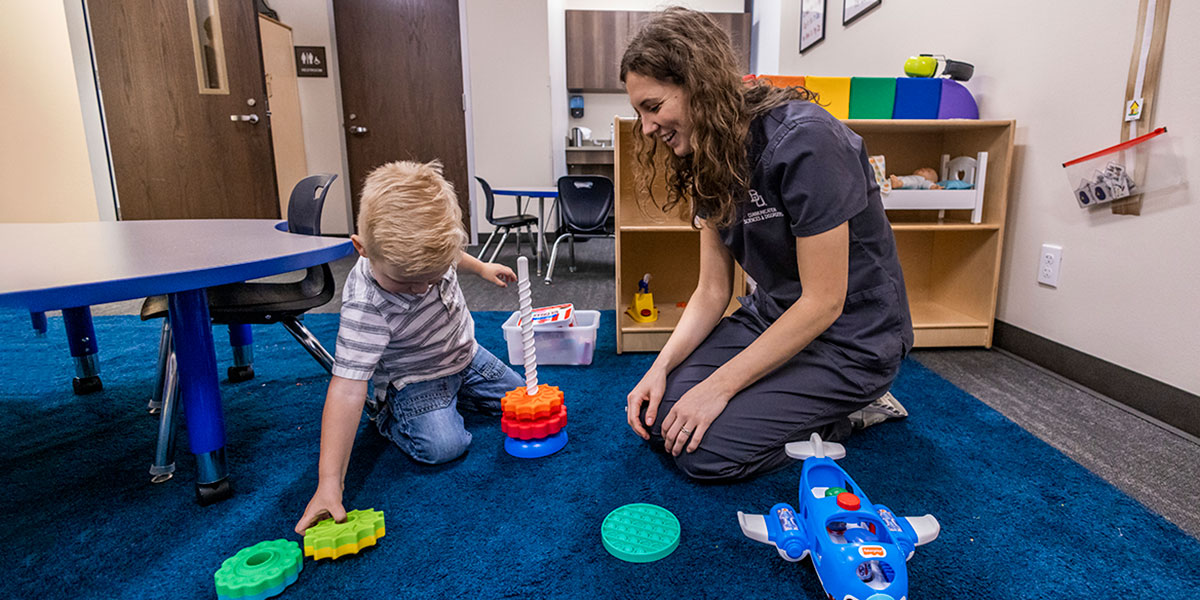New Robbins Clinic adds to Baylor’s efforts to serve those with autism (and their families)

Last month, Baylor dedicated the Mary Jo Robbins Clinic for Autism Research and Practice, which dramatically enhances the space and resources available for Baylor faculty, staff and students to serve autistic individuals (and their families). The dedication put a spotlight on the work being done at Baylor to address the challenges of a disorder that the Centers for Disease Control and Prevention estimates 1 in 44 children deal with at some level.
Inside the Mary Jo Robbins Clinic, students and faculty will advance research to address speech, language and related needs of autistic individuals and their families. The clinic is housed within Baylor’s Speech-Language and Hearing Clinic in the Robbins College of Health and Human Sciences, and features classrooms and sensory labs that both serve children and provide an educational venue for Baylor students to learn and grow as practitioners.
The Mary Jo Robbins Clinic is just the latest in Baylor’s diverse array of resources and faculty whose research serves the needs of those with autism. In the Baylor Center for Developmental Disabilities (BCDD), a resource in the School of Education, you’ll find local families and children joining forces with Baylor students and faculty to help those with autism flourish. The BCDD includes clinics, sensory labs and high-tech resources to measure student progress, and classrooms where the behavioral and skill needs of children are addressed collaboratively. And as they serve, research taking place there can help those children — and countless others who will never set foot on campus.
Across campus, multiple Baylor faculty members conduct their own research (some in partnership with these clinics) to address autism from a variety of angles. Here’s a sampling:
* Dr. Jessica Akers in the School of Education directs the Center for Assessment, Research and Education (CARE) within the BCDD and conducts research that recently earned a nearly $900,000 grant to support siblings of those with autism. As siblings often take on caretaking roles long after their parents are gone, Akers’ research provides siblings with education and training to promote positive interactions and better support their brother or sister.
* Dr. Tonya Davis (BS ’02, MS ’04) in the School of Education has focused recent research on training for classroom teachers of students with autism, equipping them with models to meet the emotional, behavioral and educational needs of students. An expert in applied behavior analysis, Davis has earned numerous grants to study interventions for challenging behaviors of children with autism and to equip teachers, parents, and other caregivers.
* Dr. Brian Garner in the School of Engineering and Computer Science created a device which benefits autistic individuals (including children). The MiraColt is a mechanical device that accurately reproduces the motion of a horse. While many with developmental disabilities benefit from equine therapy, families are often unable to access the treatment due to financial concerns or lack of access to horses. The MiraColt provides that access in classroom or clinic settings.
* Dr. Joaquin Lugo (BS ’99) in the Department of Psychology and Neuroscience runs a highly funded lab in the BSB examining the ties between epilepsy and autism. Researchers recognize a strong connection between the two, and Lugo focuses on early development of the disorder as he plays a long-game aimed at discovering future treatments.
* Dr. Sarah Mire (BA ’01) in the School of Education developed and directs the *sparc (School Psychology Autism Research Collaboration) team, which works to improve child outcomes by positively impacting the functioning of those in the systems immediately surrounding an autistic child — families, direct service providers, and school personnel.
* Dr. Kelsey Ragan (EdS ’13) in the School of Education leads the Baylor Autism Resource Clinic within the BCDD, which provides services such as assessments, counseling, and resources for parents and professionals working with autistic children.
* Dr. Kristen Padilla (EdS ’10, PhD ’20) in the School of Education serves as director of the BCDD, working with local agencies to provide trainings in working with autistic children. She also teaches graduate courses in teaching children with autism and developmental disabilities.
Sic ’em, Baylor autism researchers and clinicians!

